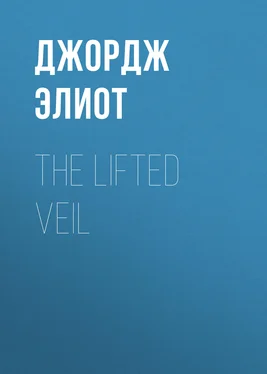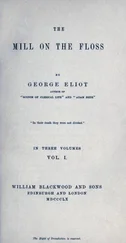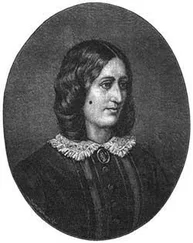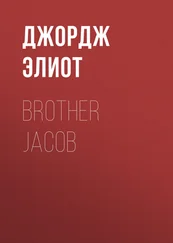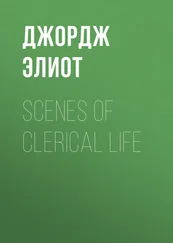Джордж Элиот - The Lifted Veil
Здесь есть возможность читать онлайн «Джордж Элиот - The Lifted Veil» — ознакомительный отрывок электронной книги совершенно бесплатно, а после прочтения отрывка купить полную версию. В некоторых случаях можно слушать аудио, скачать через торрент в формате fb2 и присутствует краткое содержание. Жанр: foreign_antique, foreign_prose, foreign_sf, на английском языке. Описание произведения, (предисловие) а так же отзывы посетителей доступны на портале библиотеки ЛибКат.
- Название:The Lifted Veil
- Автор:
- Жанр:
- Год:неизвестен
- ISBN:нет данных
- Рейтинг книги:3 / 5. Голосов: 1
-
Избранное:Добавить в избранное
- Отзывы:
-
Ваша оценка:
- 60
- 1
- 2
- 3
- 4
- 5
The Lifted Veil: краткое содержание, описание и аннотация
Предлагаем к чтению аннотацию, описание, краткое содержание или предисловие (зависит от того, что написал сам автор книги «The Lifted Veil»). Если вы не нашли необходимую информацию о книге — напишите в комментариях, мы постараемся отыскать её.
The Lifted Veil — читать онлайн ознакомительный отрывок
Ниже представлен текст книги, разбитый по страницам. Система сохранения места последней прочитанной страницы, позволяет с удобством читать онлайн бесплатно книгу «The Lifted Veil», без необходимости каждый раз заново искать на чём Вы остановились. Поставьте закладку, и сможете в любой момент перейти на страницу, на которой закончили чтение.
Интервал:
Закладка:
George Eliot
The Lifted Veil
THE LIFTED VEIL
Give me no light, great Heaven, but such as turns
To energy of human fellowship;
No powers beyond the growing heritage
That makes completer manhood.
CHAPTER I
The time of my end approaches. I have lately been subject to attacks of angina pectoris ; and in the ordinary course of things, my physician tells me, I may fairly hope that my life will not be protracted many months. Unless, then, I am cursed with an exceptional physical constitution, as I am cursed with an exceptional mental character, I shall not much longer groan under the wearisome burthen of this earthly existence. If it were to be otherwise—if I were to live on to the age most men desire and provide for—I should for once have known whether the miseries of delusive expectation can outweigh the miseries of true provision. For I foresee when I shall die, and everything that will happen in my last moments.
Just a month from this day, on September 20, 1850, I shall be sitting in this chair, in this study, at ten o’clock at night, longing to die, weary of incessant insight and foresight, without delusions and without hope. Just as I am watching a tongue of blue flame rising in the fire, and my lamp is burning low, the horrible contraction will begin at my chest. I shall only have time to reach the bell, and pull it violently, before the sense of suffocation will come. No one will answer my bell. I know why. My two servants are lovers, and will have quarrelled. My housekeeper will have rushed out of the house in a fury, two hours before, hoping that Perry will believe she has gone to drown herself. Perry is alarmed at last, and is gone out after her. The little scullery-maid is asleep on a bench: she never answers the bell; it does not wake her. The sense of suffocation increases: my lamp goes out with a horrible stench: I make a great effort, and snatch at the bell again. I long for life, and there is no help. I thirsted for the unknown: the thirst is gone. O God, let me stay with the known, and be weary of it: I am content. Agony of pain and suffocation—and all the while the earth, the fields, the pebbly brook at the bottom of the rookery, the fresh scent after the rain, the light of the morning through my chamber-window, the warmth of the hearth after the frosty air—will darkness close over them for ever?
Darkness—darkness—no pain—nothing but darkness: but I am passing on and on through the darkness: my thought stays in the darkness, but always with a sense of moving onward . . .
Before that time comes, I wish to use my last hours of ease and strength in telling the strange story of my experience. I have never fully unbosomed myself to any human being; I have never been encouraged to trust much in the sympathy of my fellow-men. But we have all a chance of meeting with some pity, some tenderness, some charity, when we are dead: it is the living only who cannot be forgiven—the living only from whom men’s indulgence and reverence are held off, like the rain by the hard east wind. While the heart beats, bruise it—it is your only opportunity; while the eye can still turn towards you with moist, timid entreaty, freeze it with an icy unanswering gaze; while the ear, that delicate messenger to the inmost sanctuary of the soul, can still take in the tones of kindness, put it off with hard civility, or sneering compliment, or envious affectation of indifference; while the creative brain can still throb with the sense of injustice, with the yearning for brotherly recognition—make haste—oppress it with your ill-considered judgements, your trivial comparisons, your careless misrepresentations. The heart will by and by be still—“ubi saeva indignatio ulterius cor lacerare nequit”; the eye will cease to entreat; the ear will be deaf; the brain will have ceased from all wants as well as from all work. Then your charitable speeches may find vent; then you may remember and pity the toil and the struggle and the failure; then you may give due honour to the work achieved; then you may find extenuation for errors, and may consent to bury them.
That is a trivial schoolboy text; why do I dwell on it? It has little reference to me, for I shall leave no works behind me for men to honour. I have no near relatives who will make up, by weeping over my grave, for the wounds they inflicted on me when I was among them. It is only the story of my life that will perhaps win a little more sympathy from strangers when I am dead, than I ever believed it would obtain from my friends while I was living.
My childhood perhaps seems happier to me than it really was, by contrast with all the after-years. For then the curtain of the future was as impenetrable to me as to other children: I had all their delight in the present hour, their sweet indefinite hopes for the morrow; and I had a tender mother: even now, after the dreary lapse of long years, a slight trace of sensation accompanies the remembrance of her caress as she held me on her knee—her arms round my little body, her cheek pressed on mine. I had a complaint of the eyes that made me blind for a little while, and she kept me on her knee from morning till night. That unequalled love soon vanished out of my life, and even to my childish consciousness it was as if that life had become more chill I rode my little white pony with the groom by my side as before, but there were no loving eyes looking at me as I mounted, no glad arms opened to me when I came back. Perhaps I missed my mother’s love more than most children of seven or eight would have done, to whom the other pleasures of life remained as before; for I was certainly a very sensitive child. I remember still the mingled trepidation and delicious excitement with which I was affected by the tramping of the horses on the pavement in the echoing stables, by the loud resonance of the groom’s voices, by the booming bark of the dogs as my father’s carriage thundered under the archway of the courtyard, by the din of the gong as it gave notice of luncheon and dinner. The measured tramp of soldiery which I sometimes heard—for my father’s house lay near a county town where there were large barracks—made me sob and tremble; and yet when they were gone past, I longed for them to come back again.
I fancy my father thought me an odd child, and had little fondness for me; though he was very careful in fulfilling what he regarded as a parent’s duties. But he was already past the middle of life, and I was not his only son. My mother had been his second wife, and he was five-and-forty when he married her. He was a firm, unbending, intensely orderly man, in root and stem a banker, but with a flourishing graft of the active landholder, aspiring to county influence: one of those people who are always like themselves from day to day, who are uninfluenced by the weather, and neither know melancholy nor high spirits. I held him in great awe, and appeared more timid and sensitive in his presence than at other times; a circumstance which, perhaps, helped to confirm him in the intention to educate me on a different plan from the prescriptive one with which he had complied in the case of my elder brother, already a tall youth at Eton. My brother was to be his representative and successor; he must go to Eton and Oxford, for the sake of making connexions, of course: my father was not a man to underrate the bearing of Latin satirists or Greek dramatists on the attainment of an aristocratic position. But, intrinsically, he had slight esteem for “those dead but sceptred spirits”; having qualified himself for forming an independent opinion by reading Potter’s Æschylus , and dipping into Francis’s Horace . To this negative view he added a positive one, derived from a recent connexion with mining speculations; namely, that a scientific education was the really useful training for a younger son. Moreover, it was clear that a shy, sensitive boy like me was not fit to encounter the rough experience of a public school. Mr. Letherall had said so very decidedly. Mr. Letherall was a large man in spectacles, who one day took my small head between his large hands, and pressed it here and there in an exploratory, auspicious manner—then placed each of his great thumbs on my temples, and pushed me a little way from him, and stared at me with glittering spectacles. The contemplation appeared to displease him, for he frowned sternly, and said to my father, drawing his thumbs across my eyebrows—
Читать дальшеИнтервал:
Закладка:
Похожие книги на «The Lifted Veil»
Представляем Вашему вниманию похожие книги на «The Lifted Veil» списком для выбора. Мы отобрали схожую по названию и смыслу литературу в надежде предоставить читателям больше вариантов отыскать новые, интересные, ещё непрочитанные произведения.
Обсуждение, отзывы о книге «The Lifted Veil» и просто собственные мнения читателей. Оставьте ваши комментарии, напишите, что Вы думаете о произведении, его смысле или главных героях. Укажите что конкретно понравилось, а что нет, и почему Вы так считаете.
